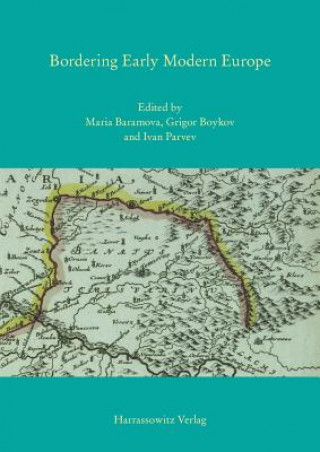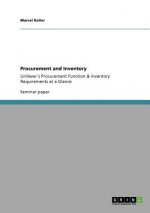
Kód: 02844314
Bordering Early Modern Europe
Autor Maria Baramova, Grigor Boykov, Ivan Parvev
Borders are usually understood as divisions between cultures, languages and political and confessional systems. Throughout Antiquity and the Middle Ages, however, borders and frontiers were not conceived of as straight lines marki ... celý popis
- Jazyk:
 Angličtina
Angličtina - Vazba: Pevná
- Počet stran: 285
Nakladatelství: Harrassowitz, 2015
- Více informací o knize

2894 Kč

Skladem u dodavatele v malém množství
Odesíláme za 10-14 dnů
Potřebujete více kusů?Máte-li zájem o více kusů, prověřte, prosím, nejprve dostupnost titulu na naši zákaznické podpoře.
Přidat mezi přání
Mohlo by se vám také líbit
-

Oxford Handbook of the Archaeology of Death and Burial
5886 Kč -

Routledge Handbook of Insurgency and Counterinsurgency
10036 Kč -

Procurement and Inventory
1063 Kč -

Advances in High Performance Computing
1665 Kč -

Bollywood's India
875 Kč -

Le gentil petit diable et autres contes de la Rue Broca/Edition specia
293 Kč -

Dancer in the Revolution
772 Kč
Darujte tuto knihu ještě dnes
- Objednejte knihu a zvolte Zaslat jako dárek.
- Obratem obdržíte darovací poukaz na knihu, který můžete ihned předat obdarovanému.
- Knihu zašleme na adresu obdarovaného, o nic se nestaráte.
Více informací o knize Bordering Early Modern Europe
Nákupem získáte 289 bodů
 Anotace knihy
Anotace knihy
Borders are usually understood as divisions between cultures, languages and political and confessional systems. Throughout Antiquity and the Middle Ages, however, borders and frontiers were not conceived of as straight lines marking territories and political dominions, but they were mostly perceived as symbolic areas which, instead of purely dividing, were rather contested and debated zones. Their most pervasive feature was contact rather than separation. The dynamic and profound changes in Early Modern European society, such as the emergence of the idea of the territorial state, the great geographical discoveries and the beginning of modern cartography, shaped a new vision of the delineating border. The Early Modern era was the period when the loose concept of border was gradually consolidated in a more refined view of the concept of frontiers and spatial divisions in Europe. Yet, even though during the Early Modern period the lines of religious, political and ideological separation crystallized to define a completely new notion of state and regional frontiers in the modern sense, recent scholarship tends to emphasize that modern concepts of national frontiers are not fully applicable to the Early Modern age.§The present volume includes the papers of nineteen historians who participated in the conference "Bordering Early Modern Europe" held in Sofia in March 2013. Building on the achievements of previous scholarship on European borders during the Early Modern period and on the current understanding of European boundaries, the essays in the present volume offer a new interpretation of various aspects of the theme of borders in Europe, as well as new impulses for future research.
 Parametry knihy
Parametry knihy
2894 Kč
- Plný název: Bordering Early Modern Europe
- Autor: Maria Baramova, Grigor Boykov, Ivan Parvev
- Jazyk:
 Angličtina
Angličtina - Vazba: Pevná
- Počet stran: 285
- EAN: 9783447104029
- ISBN: 3447104023
- ID: 02844314
- Nakladatelství: Harrassowitz
- Hmotnost: 700 g
- Rozměry: 245 × 175 × 19 mm
- Datum vydání: 13. November 2015
Oblíbené z jiného soudku
-

Dune
216 Kč -

Haunting Adeline
621 Kč -

Berserk Deluxe Volume 2
1092 Kč -

White Nights
90 Kč -

Powerless
268 Kč -

Atomic Habits
330 Kč -

Dune Messiah
228 Kč -

Berserk Deluxe Volume 3
1142 Kč -

One Day
221 Kč -

Berserk Deluxe Volume 1
1115 Kč -

Iron Flame
368 Kč -

Surrounded by Idiots
213 Kč -

Harry Potter and the Prisoner of Azkaban (Minalima Edition)
993 Kč -

Gravity Falls Journal 3
443 Kč -

Heaven Official's Blessing: Tian Guan Ci Fu (Novel) Vol. 1
440 Kč -

The Creative Act
568 Kč -

Dune
276 Kč -

Hunting Adeline
624 Kč -

A Little Life
290 Kč -

Children of Dune
230 Kč -

Heaven Official's Blessing: Tian Guan Ci Fu (Novel) Vol. 2
427 Kč -

Bungo Stray Dogs, Vol. 8 (light novel)
383 Kč -

Percy Jackson and the Olympians 5 Book Paperback Boxed Set
944 Kč -

Solo Leveling, Vol. 1
440 Kč -

The Prisoner's Throne
247 Kč -

Court of Thorns and Roses
268 Kč -

Cry Baby Coloring Book
276 Kč -

Fourth Wing
405 Kč -

Icebreaker
199 Kč -

Berserk Deluxe Volume 6
1089 Kč -

Avatar, the Last Airbender: The Kyoshi Novels (Box Set)
986 Kč -

The 48 Laws of Power
601 Kč -

House of Leaves
611 Kč -

Twisted Lies
213 Kč -

Dune Messiah
272 Kč -

No Longer Human
359 Kč -

48 Laws Of Power
331 Kč -

Twisted Games
213 Kč -

Caraval Paperback Boxed Set
902 Kč -

Solo Leveling, Vol. 2
468 Kč -

Open Circuits
907 Kč -

Berserk Deluxe Volume 5
1119 Kč -

Heaven Official's Blessing: Tian Guan Ci Fu (Novel) Vol. 3
476 Kč -

Berserk Deluxe Volume 4
1292 Kč -

Court of Mist and Fury
206 Kč -

SOLO LEVELING V08
436 Kč -

English File Upper Intermediate Multipack A (4th)
531 Kč -

CHAINSAW MAN V14
251 Kč -

Before the Coffee Gets Cold
184 Kč
Osobní odběr Praha, Brno a 12903 dalších
Copyright ©2008-24 nejlevnejsi-knihy.cz Všechna práva vyhrazenaSoukromíCookies


 Vrácení do měsíce
Vrácení do měsíce 571 999 099 (8-15.30h)
571 999 099 (8-15.30h)